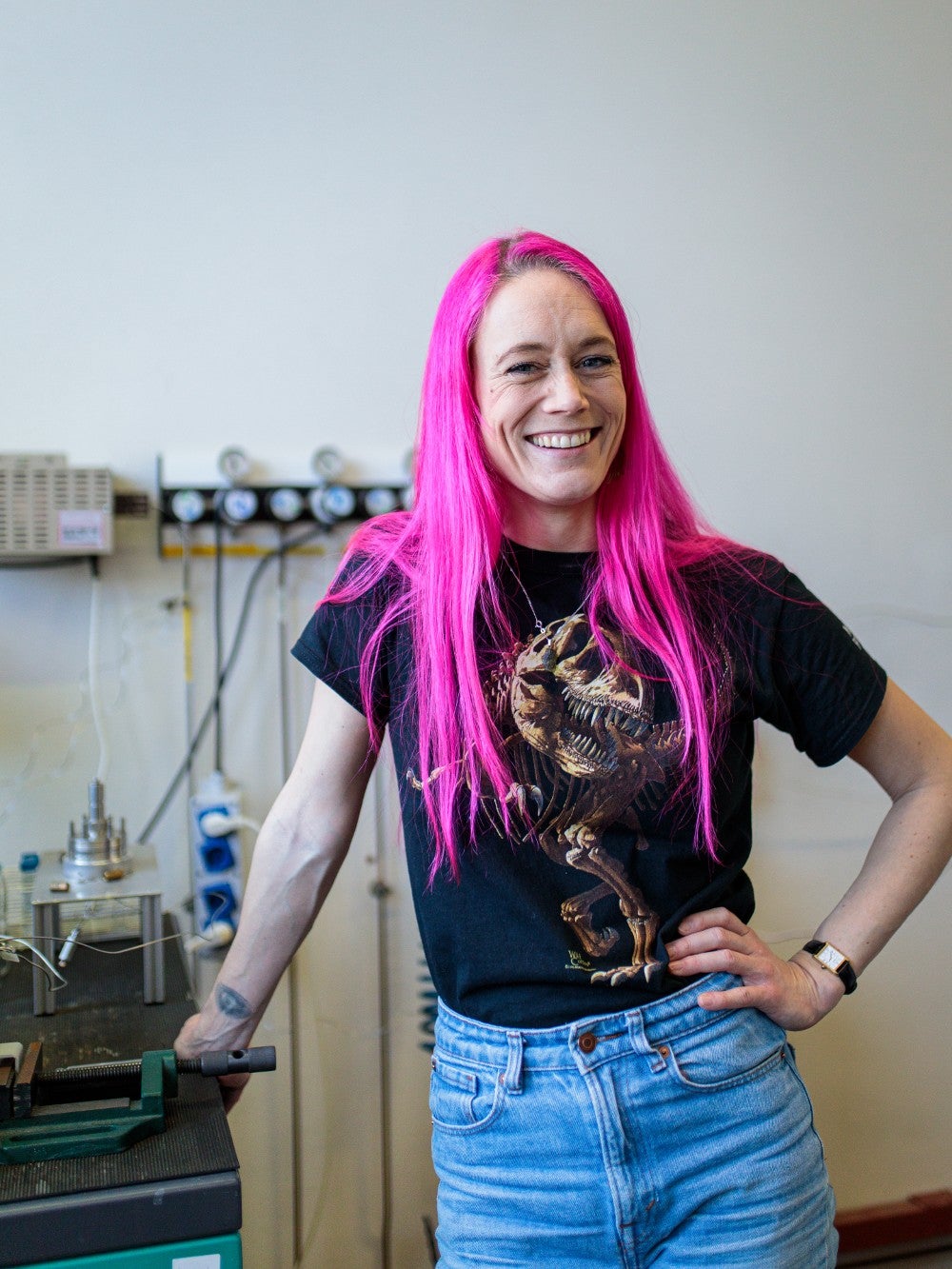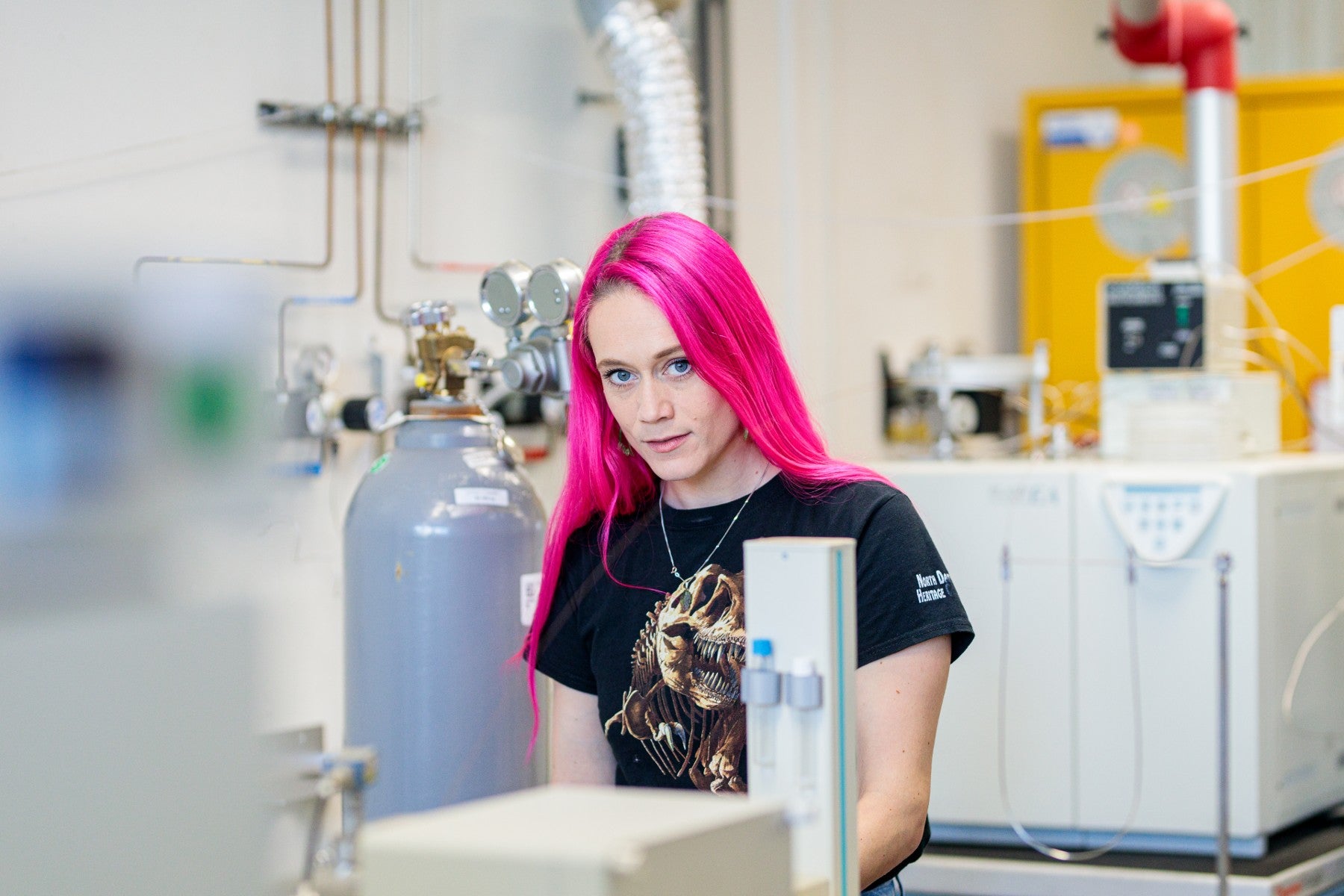Melanie During could well be called the most famous paleontologist in the Netherlands. „I've heard from other scientists: why don't you choose a normal hair color and not stand out so much? I'm glad I didn't listen."
Fortunately, we meet During in a lab at the Vrije Universiteit Amsterdam, where she is conducting her final research for her PhD at Uppsala University in Sweden. We talk to her about the magic of paleontology, her past as a troubled youth, and how she spoke out about MeToo in academia.
You're finishing your PhD, your book has just been released, and you've suddenly become popular on the television program 'De slimste mens.' Was this an eruption of a rock-solid strategy?
„The only strategy I have is that I'm a workaholic, and sometimes it works out well, like now. Actually, I chronically do too much, and often you don't notice it because many things I do are those enormous long-term projects. Just now, a number of these projects have come to an end."
Your academic life took you to several universities. What was studying like for you?
„I found my courses interesting in terms of content, but my time as a student was a challenge. Studying is expensive, and I had no financial support, so I worked myself to the bone. I've been a cleaner, I've done modeling, worked in a kitchen, and acted. And I barely made it through. Exhausted, I sat in the lecture halls. Many of my fellow students just had wealthier parents. If they took out loans, it was to buy a scooter, while I had to borrow money to pay my rent."
Were you the first in your family to go to university?
„Yes. Only when I recently heard the term "first-generation student" did I realize: hey, that was me too. I felt a bit lost at the university, not knowing where to turn with my questions or how such an academic environment even worked."
„After my bachelor's at the UvA, I decided to pursue my master's in Paleoclimatology at the VU. It felt like I was coming home for the first time at the university, belonging somewhere. I don't know, maybe it's the state of the building, but I found it cozier here, more homely. I felt more like I was here with people who, like me, were curious about the earth. And about the past of the earth. I've always enjoyed my time here."
„Still, that doesn't mean I didn't have any difficulties. I always wondered why the other students didn't mind when they suddenly had to pay 500 euros to go to Scotland for an excursion within two months. I was completely shocked and didn't know how to manage financially. Then some of my fellow students would say, 'Just ask for it for your birthday.' 'From who?' I would ask."
What fascinates you about paleontology?
„I always just want to know how something works. And what's really going on. I can lie awake at night wondering about it. For example, I wonder: which animals in the water actually have a neck? And then I realize that's probably a very strange question for someone else to ask. Because if you look at fish: fish don't have necks. But if you look at the marine reptiles we had in the past, there was indeed the plesiosaurus with a very long neck. Why? Because fish don't have them. So it's an adaptation from the land that they took into the water. But why? I don't have an answer yet. My partner Dennis is also a paleontologist and just as curious. We've just agreed not to wake each other up with questions anymore."
I'm also a "techniques collector." So it's not so much that I always wanted to know all the animals, or that I wanted to memorize all the rocks. I always want to be able to measure things. Know how to measure things. What techniques do I need to measure what. So I'm kind of a ‘techniques hoarder.’ For example, how I'm currently trying to clarify the life history and timing of extinctions by studying fossil vertebrates with new measurement possibilities for my PhD."

Do you feel you often have to explain the relevance of paleontology?
„Definitely. In the academic world, the competition is high, and you compete with the health sciences. We don't cure cancer, and we also don't claim that we will. So paleontology is quickly said to have low relevance, while we actually want to better understand how life on earth has developed. Because we're all not quite sure about that yet."
Doesn't the climate make paleontological research more relevant?
„As far as I'm concerned, definitely. The periods in the past when the amount of CO2 in the atmosphere was high coincide with mass extinctions. But the point is not that we haven't already made that link. In our field, it's the most natural thing in the world to talk about how badly things are going, for more than a century. But for some reason, it takes a while to sink in with the people who need to do something about it."
I saw that you also give lectures on your field at schools.
„What makes dinosaurs so magical for children? At the end of the era of the dinosaurs, the earth really looked a bit like the earth as we know it. For example, flowers already existed. So you can really imagine those giants walking through our world, and us walking among them. It's very far away and at the same time, therefore, close by."
„I was fascinated as a child too. It started when I was collecting shells and discovered they were fossils. It's really like treasure hunting and then, when you research it, you always have a story. At the very least, you can tell what kind of animal you've researched or what event took place. That's what I find so fun about it."
Is paleontology a popular field?
„Paleontology is a very attractive science. Kids get excited about it, and that creates interest in many more scientific areas. I see it as a gateway drug, but in a positive sense. I also think that's why it's nice for science that paleontology gets so much attention and media attention. I am glad that I can contribute my part to that. From other scientists, I've sometimes heard: 'Can't you just take a normal hair color and not stand out so much?' I'm glad I didn't listen."
„That popularity does mean that everyone is interested in paleontology, so there are too few jobs. The competition is high. And it's also not - and this sounds very strange - a field in which you can really excel. You have to be lucky. Lucky that you can research the right thing, that you find the right thing, that your equipment cooperates. That the data actually comes out. And that you can actually get a grant. I don't think there's such a thing as a brilliant paleontologist, so it's very difficult to stand out."
You call it luck, but I heard that as a student, you raised your hand during a lecture, and that subsequently led to a publication in the renowned research journal Nature.
„Ha, that's correct. I was in the audience when geology professor Jan Smit talked about a research area in North Dakota, where dinosaurs went extinct due to a meteorite impact. I told him that if he had fossils of animals that died from the impact, we could do isotope research to reconstruct the climate of the last few years. Afterwards, Smit said I could make that my thesis."
„I was incredibly lucky because afterwards we were allowed to publish. Luck doesn't just come to you. You have to be receptive to it and go out to encounter it. Setbacks also come your way, but you get used to them, and that's how you also learn when to let go or when to stand your ground."
You stood your ground when you wrote on social media platform X last year that a well-known paleontologist 'is a sexual predator and must face the consequences'?
„That's correct. I was terrified to speak out, but I had a bad experience with him 9 years ago. He assaulted me at a scientific conference. I didn't dare say anything then, as I would be that hysterical girl. Only years later, when I heard from other paleontologists at a conference that it was still happening, could I no longer keep quiet. I knew that if I didn't speak up, it would continue. It was acted upon: he is now suspended and is being prosecuted."
Were you worried about what it meant for your career?
„I was afraid of being dismissed. That's why I kept it quiet for so long. But it was unsustainable not to do it. Later, I heard that it was specifically foreign students he targeted, who had no safety net. Everyone in the field knew it, said he was a creep, and everyone ignored it. I didn't want to bow to that."
Have you often dealt with discrimination within the field?
„At first, I thought not. During my studies, the male-to-female ratio was equal, but the further you go, the more you think: where are all the female professors? Where are the female heads of departments? Why do they all disappear after their PhD?"
„But personally, I also faced intimidation. I was often the only woman during fieldwork. I heard so often how I should dress in the field so as not to distract anyone. That I couldn't work in my bikini top at 45 degrees, while the men had been working without shirts for weeks. During my fieldwork in North Dakota, I was alone with a single American paleontologist. That was a disaster. Ten days alone with him, and I couldn't say anything because he had to take me back to the airport."
The conflict doesn't appear in your book 'The Last Spring of the Dinosaurs.' But you write about your love for the field and about your personal life: not the standard recipe for a popular science book. Why make that choice?
„My mother and sisters always looked so troubled when I talked about my research. Then they would boredly remark: 'There goes Melanie again with her difficult words and her difficult things.' A shame, because I thought they would find it very interesting. When I started giving lectures more often, an editor tracked me down. Her email arrived a few days after the birth of my son, and with him at my breast, I read her request. It therefore took a bit longer, but writing tastes like more. But I've promised myself that I can only write one during my PhD.'"
„I also wrote it for young people like me. I'm a former troubled youth and feel that too few people - including the youths themselves - see the potential of those youths. I want other sixteen-year-olds to read that you can do vmbo at sixteen and still do a PhD later. If you're not happy at 25, then go back to school. If you've had bad luck during your youth, then there's shame attached to it. I've learned that my strength is that I climbed out of that. Since that realization, I tell it too, because it's part of who I am. In that way, I look at all organisms. I see an individual, and if that individual is just a bit different than another, I'm not going to call it a new species. It might just be a odd duck. And we can't have enough odd ducks."






